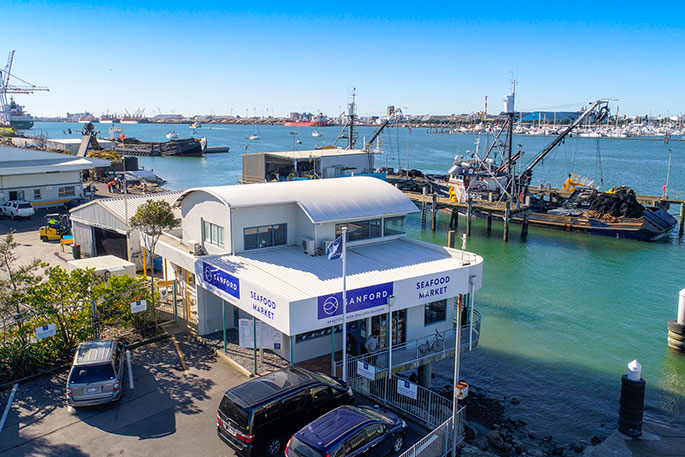New Zealand seafood company Sanford Limited (NZX: SAN) has today reported Adjusted Earnings Before Interest and Tax of $32.6m for the six months to 31 March 2019.
This represents a decrease of eight per cent on the same period last year ($35.4m).
The company saw a Net Profit After Tax of $22.9m, which is a 16 per cent reduction on the same period last year ($27.3m).
The prior year included a one-off insurance settlement for earthquake damage to Sanford's Havelock mussel processing plant of $9.9m, whereas the 2019 result included a gain on sale of $4.1m for some of Sanford's pelagic quota.
Sanford has achieved a slight lift in its EBIT per greenweight kilogram from $0.56 per kilogram in the first six months of 2018 to $0.57 per kilogram in the same period for 2019.
Group CEO Volker Kuntzsch says the result is satisfactory, considering the challenges Sanford faced during the period.
'The first half of the 2019 year was marked by the sad loss of crew member Steffan Stewart on board our deepwater vessel San Granit.
"Following Steffan's death, we undertook an extensive review of all factory equipment and processes with a view to trying to identify further ways of mitigating potential health and safety risks. The Granit remained in port for three months, which impacted on our catches and subsequently on our financial result.”
The reduced catches resulted in a decrease in sales volume of 12 per cent year-on-year, with revenue flat on a comparable basis at $272m.
One key development in the first half of the 2019 financial year was the divestment of the pelagic assets which Volker says is in line with Sanford's strategy to focus on areas where maximum value can be achieved.
'Our ability to improve returns on species like mackerel is limited and depends on factors such as global commodity pricing where we have a negligible influence.
"We are thankful to the teams who have given Sanford great service in this part of the business over many years and we are pleased that many of them have found work with Pelco, the Tauranga-based purchaser of our pelagic assets.”
Sanford Chief Financial Officer, Katherine Turner says, the challenges of the first half are reflected in the result.
'The sad loss of Steffan certainly had an impact, both on our result and on Sanford as a family. Plus we have faced some ongoing climatic challenges such as increased biofouling on our mussel lines in the Coromandel.
"However, the result confirms that our push towards achieving maximum value for our beautiful New Zealand seafood is the right one. Our mussel and salmon business units are performing better and the focus on delivering more fresh fish has helped to strengthen the results from our inshore fleet.
"On our deepwater fishing vessels, we are increasing the proportion of high value products we produce from species such as hoki and this has resulted in a pleasing improvement of returns for that species.”
The company has reported several highlights for the 2019 first half trading period, including the opening of a beautifully refreshed Auckland Fish Market in the increasingly fashionable and food conscious Wynyard Quarter.
Volker says the market opening was a great success.
'Sanford has been present in this area for many decades and now we are delighted to be able to offer seafood lovers from Auckland and far beyond a modern, dynamic and world class Fish Market.
"The opening was a significant event with a number of high profile guests and the feedback from media and from all our visitors has been extremely positive.
"As well as the eight seafood-focused eateries in the Market, we have opened a rebranded Sanford & Sons fishmonger, which sells a wide range of Sanford caught and farmed seafood and highlights our sustainability story.”
Sanford has also celebrated the launch of its wholly owned supplements brand Sea to Me in the first half of 2019.
With Greenshell mussel powder capsules for natural inflammation management the launch represents Sanford's first foray into online commerce and coincides with positive developments at the company's mussel powder plant in Blenheim, which has already doubled in size in recent months.
A further positive development in Sanford's aquaculture business has been the granting of a consent variation allowing a higher nitrogen cap in the company's salmon farming operations in Stewart Island.
"We are grateful to everyone who took part in this process and particularly to the Stewart Island and wider Southland communities who took the time to understand the proposal. We believe these changes will bring significant benefits to the area in a sustainable way," says Volker.
He says the outlook for the rest of the fishing and financial year is, on balance, positive.
'Overall we feel that our result for the first half of 2019 has been satisfactory, despite the setbacks. We are cautiously optimistic about the second half of our financial year as our fishing volumes are encouraging and our salmon business is developing well, but an algal bloom in the Marlborough Sounds has limited the mussel harvest season for an extended period.
"We will continue on our path towards maximum value, while putting sustainable fishing and farming and the success and safety of our people front and centre.”



1 comment
Refreshing...
Posted on 23-05-2019 12:31 | By morepork
… to see a sensible statement of direction instead of a load of excuses as to why profits were down. Sanford are developing to be the kind of Company we can all be proud of. The secret is to manage properly, and recognize obligations to the environment and the community (TCC, please take note...)
Leave a Comment
You must be logged in to make a comment.